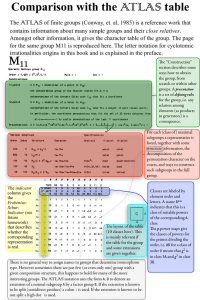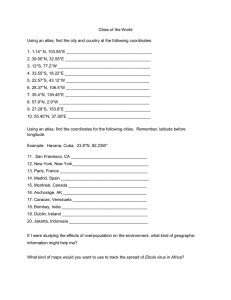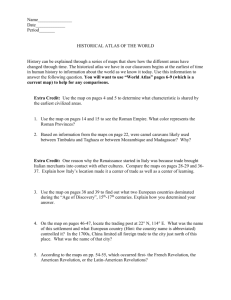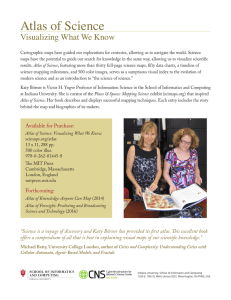World History Since 1500
advertisement
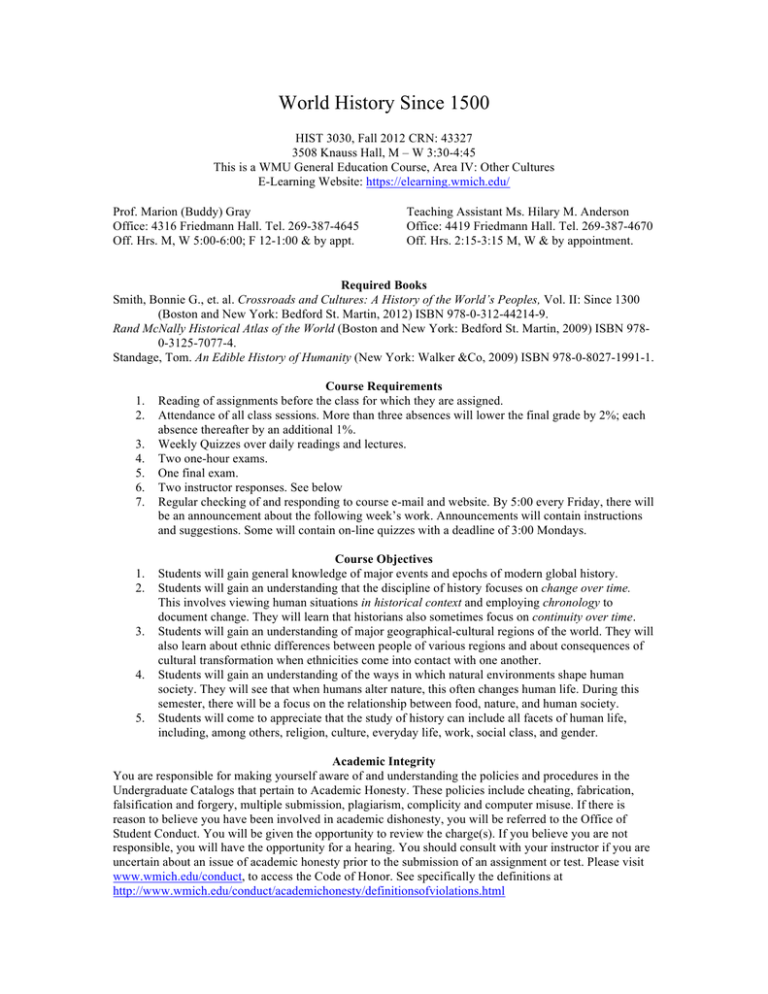
World History Since 1500 HIST 3030, Fall 2012 CRN: 43327 3508 Knauss Hall, M – W 3:30-4:45 This is a WMU General Education Course, Area IV: Other Cultures E-Learning Website: https://elearning.wmich.edu/ Prof. Marion (Buddy) Gray Office: 4316 Friedmann Hall. Tel. 269-387-4645 Off. Hrs. M, W 5:00-6:00; F 12-1:00 & by appt. Teaching Assistant Ms. Hilary M. Anderson Office: 4419 Friedmann Hall. Tel. 269-387-4670 Off. Hrs. 2:15-3:15 M, W & by appointment. Required Books Smith, Bonnie G., et. al. Crossroads and Cultures: A History of the World’s Peoples, Vol. II: Since 1300 (Boston and New York: Bedford St. Martin, 2012) ISBN 978-0-312-44214-9. Rand McNally Historical Atlas of the World (Boston and New York: Bedford St. Martin, 2009) ISBN 9780-3125-7077-4. Standage, Tom. An Edible History of Humanity (New York: Walker &Co, 2009) ISBN 978-0-8027-1991-1. 1. 2. 3. 4. 5. 6. 7. 1. 2. 3. 4. 5. Course Requirements Reading of assignments before the class for which they are assigned. Attendance of all class sessions. More than three absences will lower the final grade by 2%; each absence thereafter by an additional 1%. Weekly Quizzes over daily readings and lectures. Two one-hour exams. One final exam. Two instructor responses. See below Regular checking of and responding to course e-mail and website. By 5:00 every Friday, there will be an announcement about the following week’s work. Announcements will contain instructions and suggestions. Some will contain on-line quizzes with a deadline of 3:00 Mondays. Course Objectives Students will gain general knowledge of major events and epochs of modern global history. Students will gain an understanding that the discipline of history focuses on change over time. This involves viewing human situations in historical context and employing chronology to document change. They will learn that historians also sometimes focus on continuity over time. Students will gain an understanding of major geographical-cultural regions of the world. They will also learn about ethnic differences between people of various regions and about consequences of cultural transformation when ethnicities come into contact with one another. Students will gain an understanding of the ways in which natural environments shape human society. They will see that when humans alter nature, this often changes human life. During this semester, there will be a focus on the relationship between food, nature, and human society. Students will come to appreciate that the study of history can include all facets of human life, including, among others, religion, culture, everyday life, work, social class, and gender. Academic Integrity You are responsible for making yourself aware of and understanding the policies and procedures in the Undergraduate Catalogs that pertain to Academic Honesty. These policies include cheating, fabrication, falsification and forgery, multiple submission, plagiarism, complicity and computer misuse. If there is reason to believe you have been involved in academic dishonesty, you will be referred to the Office of Student Conduct. You will be given the opportunity to review the charge(s). If you believe you are not responsible, you will have the opportunity for a hearing. You should consult with your instructor if you are uncertain about an issue of academic honesty prior to the submission of an assignment or test. Please visit www.wmich.edu/conduct, to access the Code of Honor. See specifically the definitions at http://www.wmich.edu/conduct/academichonesty/definitionsofviolations.html HIST 3030 World History Since 1500 Fall 2010 Page 2 of 3 Grade Components 20% Quizzes. Thirteen quizzes. There will be no make-up quizzes. The 3 lowest grades will be dropped. 50% In-class exams. Two at 25% each. 30% Final Exam. Grading Scale 94-100%= A (exceptional) 74-76% = C (satisfactory 88-93%= BA (excellent) 67-73% = DC (acceptable) 84-87% = B (very good) 64-66% = D (poor) 77-83% = CB (good) below 63% = E (failing) E-Mail and Course Website E-Mail is an official means of university communication. You are required to use the course website or your WMU e-mail account for all university correspondence. It is your responsibility to check your WMU e-mail account regularly and open e-mails from the instructor or the teaching assistant. E-Mail is a professional form of communication. Please use correct grammar, complete sentences, correct spelling, and appropriate forms of address. Religious Observances Policy It is your responsibility to make arrangements with me in advance of any planned religious holidays. Contact me with sufficient notice, and we will discuss alternative assignment options. Religious observance does not relieve you of course responsibilities. For more information, please access http://www.wmich.edu/policies/religious-observances.html. Academic Accommodation for Persons with Disabilities In compliance with, and in the spirit of, the Americans with Disabilities Act (ADA), I want to work with you if you have a disability that is relevant to your work in this course. If you have a documented disability and wish to discuss academic accommodations, please contact me as soon as possible. You may also contact the Office of Disabled Student Resources and Services at 269-387-2116 or www.wmich.edu/disabilityservices. Instructor and Course Evaluation System (ICES) Near the end of the term you will be contacted by the Office of Institutional Effectiveness and asked to complete an evaluation form for this course, please do so. The form will be made available through GoWMU by using your Bronco NetID and password. Please take this responsibility seriously. Instructor Responses: Twice during the semester (Oct. 1 & November 5) instructor responses are due. This is your opportunity to communicate with me about any topic that you wish to discuss. The instructor responses will be graded on a credit/no credit basis. All thoughtful, responsible responses will receive credit. Look for directions under weekly instructions on the course website. Maintaining Your Own Records It is your responsibility to keep and store carefully all returned graded material. In case you have questions about your grade, it will be necessary to bring in the material. Without this, questions cannot be considered. The Classroom: A Place for Learning. No Texting, etc. Please respect your fellow students and your instructor by refraining from all distracting activity in class, including talking (except during class discussions), using cell phones, text-messaging, reading web materials not related to the class and reading newspapers. Arrive by the beginning of class and do not leave before class is over. HIST 3030 World History Since 1500 Fall 2010 Page 3 of 3 Schedule of Reading Assignments and Examinations September W. 5: Introduction; Chronology; the Early Modern World M. 10: Standage, Part I, pp. 1-27. “The Edible Foundations of Civilization.” Atlas* 6, 25. 104. W. 12: Standage, Part II, pp. 31-62. “The Roots of Modernity.” Atlas 6, 8, 25. M. 17: Smith, Ch. 16, pp. 508-529. The Americas 1430-1530. Atlas 25, 54. W. 19: Smith, Ch. 16, pp. 529-542. The Americas 1430-1530. Atlas 25, 54. M. 24: Smith, Ch. 17, pp. 545-562. Rise of the “Atlantic World” 1450-1600. Atlas 40. W. 26: Smith, Ch. 17, pp. 562-577. Fall of American Empires 1450-1800. Atlas 40. October M. 1: Smith, Ch. 18, pp. 580-600. West Africa and the Slave Trade 1450-1800 Atlas 27, 74. W. 3: Standage, Part III, pp. 63-104. “Global Highways of Food.” Atlas, 12, 26, 30, 40. M. 8: Smith, Ch. 19, pp. 612-635. Trade & Empire in the Indian Ocean 1450-1750 Atlas 24. W. 10: Smith, Smith, Ch. 20, pp. 646-670. Europe & the Mediterranean 1450-1750. Atlas 28, 36. M. 15: FIRST IN-CLASS EXAM. W. 17: Smith, Ch. 21, pp. 682-704. Expansion and Isolation in Asia 1450-1750. Atlas 44, 46. M. 22: Smith, Ch. 22, pp. 718-736; 741-748 (1st paragraph). The American Colonies 1450-1750. W. 24: Smith, Ch. 23, pp. 758-781. Atlantic Revolutions 1750-1830. Atlas 56 M. 29: Standage, Part IV, pp. 107-142. The New World, New Foods, Steam Power. Atlas 40, 66. W. 31: Smith, Ch. 24, pp. 790-812; 818-820. Industry &Changing Lives 1750-1900.Atlas 66, 80. November M. 5: Smith, Ch. 25, pp. 824-843. Modern Nation States 1850-1900. Atlas 60, 62, 64, 65, 68, 72. W. 7: Standage, Ch. 9, pp. 145-170. Food, a Weapon. Atlas 56, 57. M. 12: SECOND IN-CLASS EXAM W. 14: Smith, Ch. 26, pp. 856-875. Imperial Order, Disorder 1850-1914. Atlas 70, 71, 76, 78, 80. M. 19: Smith, Ch. 27, pp. 890-911. War, Revolutions 1910-1929. [W. 21: Thanksgiving Recess, no class] M. 26: Smith, Ch. 28, pp. 925-951. The Great Depression and World War II. Atlas 84, 85. W. 28: Smith, Ch. 29, pp. 958-980. New Nations and the Cold War 1945-1970. Atlas 84, 86. December M. 3: Standage, Ch. 10, pp. 171-197. Food, Cold War, Post Cold War 1945-present. Atlas 94. W. 5. Smith, Ch. 30, pp. 992-996 & Ch. 31, pp. 1037-1048. Science, Technology, Globalization 1960-present. Atlas 89, 94. MONDAY DECEMBER 10, 5:00-7:00: FINAL EXAMINATION *Two-page maps in the atlas are indicated by the first page number. Use the whole map. Also, always give attention to the maps in Smith. Compare maps.
